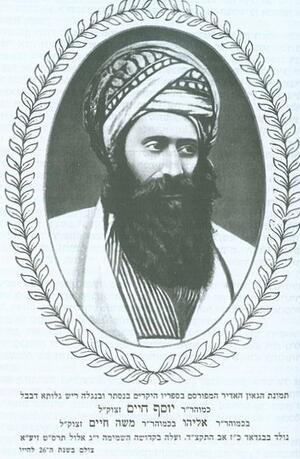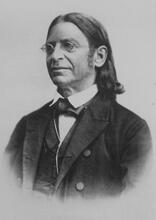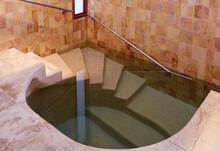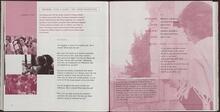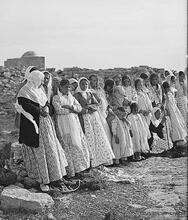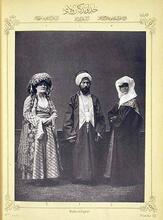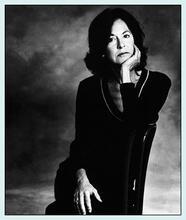Ben Ish Hai
The Ben Ish-Hai, R. Yosef Hayyim ben Eliyahu, age 26.
Text reads, "Picture of the great, the mighty, the famous, in his valuable writings, in the unseen and in the seen, leader of the Diaspora of Babylon (Iraq), the teacher, Rabbi Yosef Hayyim, of righteous and holy memory for a blessing, son of the teacher, Rabbi Eliyahu, son of the teacher, Rabbi Moshe Hayyim, of righteous and holy memory for a blessing. Born in Baghdad on the 27th of Av 5594 (1st of September 1834), and rose to the holiness of Heaven (died) on the 13th of Elul 5669 (30th August 1909), may his merit be upon us, amen. Pictured in the 26th year of his life."
Source: Wikimedia Commons
The Ben Ish-Hai, R. Joseph Hayyim b. Elijah, was a well-known Baghdadi Torah scholar. He wrote many responsa and halakhic books, which included his rulings on women’s halakhot. He also wrote Hukkei Ha-Nashim (Laws of Women) in Arabic, as a practical halakhic guide for women.
R. Joseph Hayyim ben Elijah al-Hakam was a well-known Torah she-bi-khetav: Lit. "the written Torah." The Bible; the Pentateuch; Tanakh (the Pentateuch, Prophets and Hagiographia)Torah scholar and preacher who wrote many The legal corpus of Jewish laws and observances as prescribed in the Torah and interpreted by rabbinic authorities, beginning with those of the Mishnah and Talmud.halakhic, The esoteric and mystical teachings of JudaismKabbalistic, and homiletical books, but never held any public position. His book Ben Ish Hai, which is a sort of abbreviated Shulhan Arukh containing Kabbalistic teachings, halakhah, and customs, arranged according to the weekly Torah (Pentateuch) readings, is to the present day fairly popular among Lit. "Eastern." Jew from Arab or Muslim country.Mizrahi Jewish communities. His major collection of Halakhic decisions written by rabbinic authories in response to questions posed to them.responsa, Rav Pe’alim, includes responsa on a wide variety of subjects, both halakhic and Kabbalistic, to queries from Jews in Baghdad and all of Iraq, and even from communities throughout Asia: India, Singapore, Sri Lanka, Kurdistan, and other localities. R. Joseph Hayyim also wrote Torah le-Shemah, a collection of short responsa which he signed Yehezkel Kehali (a pen name with the same numerical value as Yosef Hayyim), and Hukkei Ha-Nashim (Women’s Laws), a work in Arabic for women.
This is a list of various halakhot concerning women in the Ben Ish-Hai’s work.
Torah Study
Women are not to participate in the Shavuot eve tikkun, but they may take part in the tikkun for Hoshana Rabba eve. The difference between these two study vigils lies in their differing Kabbalistic significance (Rav Pe’alim, vol. 1, Sod Yesharim, para. 9).
Positive Time-Bound Commandments
R. Joseph Hayyim has Kabbalistic explanations for the exemption of women from these obligations. According to him, women recite blessings for the performance of such commandments, despite their exemption, with the exception of Fringes attached to each of the four corners of a special garment worn to fulfill a Biblical precept.zizit, Phylacteriestefillin, and the counting of the omer, which women are not permitted to observe for Kabbalistic reasons (Rav Pe’alim, vol. 1, Sod Yesharim, para. 12). Although women are obligated regarding Lit. "sanctification." Prayer recited over a cup of wine at the onset of the Sabbath or Festival.kiddush on the Sabbath, it is preferable that a man recite it for a woman, again on Kabbalistic grounds (Rav Pe’alim, vol. 3, Sod Yesharim, para. 6). Women are required to eat on the day preceding The Day of Atonement, which falls on the 10th day of the Hebrew month of Tishrei and is devoted to prayer and fasting.Yom Kippur because they are obligated to fast (Torah le-Shemah, para. 162). R. Joseph Hayyim relates that the women in Baghdad are meticulous about hearing the Ram's horn blown during the month before and the two days of Rosh Ha-Shanah, and at the conclusion of Yom Kippur. shofar on The Jewish New Year, held on the first and second days of the Hebrew month of Tishrei. Referred to alternatively as the "Day of Judgement" and the "Day of Blowing" (of the shofar).Rosh Ha-Shanah; they sleep in the Booth erected for residence during the holiday of Sukkot.sukkah, because they have to be with their husbands, but are not exacting regarding eating there (Hukkei Ha-Nashim, para. 43). Although women are obligated regarding the reading of the Book of Esther on Holiday held on the 14th day of the Hebrew month of Adar (on the 15th day in Jerusalem) to commemorate the deliverance of the Jewish people in the Persian empire from a plot to eradicate them.Purim, they are to hear its reading by a man, and not to read for themselves (Ben Ish Hai, vol. 1, Laws of Purim; trans. Hiley: vol. 1, Laws of Purim: 243).
Immersion on Rosh Ha-Shanah and on the Eve of Yom Kippur
It is customary for women to immerse at these times, so that they will come to pray in the synagogue in a state of purity; this practice is correct for both unmarried and married women during the seven clean days following their menstrual period (Rav Pe’alim, vol. 4, Yoreh De’ah, para. 16; Ben Ish Hai, vol. 1, Nizavim, para. 3; trans. Hiley: vol. 2: 250).
Rosh Hodesh
Women customarily refrain from work on Rosh Hodesh and light candles on the eve of Rosh Hodesh (Hukkei Ha-Nashim, para. 43). This is a special privilege reserved for women, since they did not participate in the sin of the Golden Calf (Ben Ish Hai, vol. 2, Vayikra, para. 1).
Kaddish
A woman may not recite Lit. (Aramaic) "holy." Doxology, mostly in Aramaic, recited at the close of sections of the prayer service. The mourner's Kaddish is recited at prescribed times by one who has lost an immediate family member. The prayer traditionally requires the presence of ten adult males.Kaddish for her parents (Torah le-Shemah, para. 27).
Bat Mitzvah
The day that a girl assumes responsibility for the commandments is to be celebrated: she wears a new garment and recites the sheheheyanu (“... who has kept us alive”) blessing, relating also to her new status as obligated by the commandments. It is not customary to conduct a festive meal, as is done for boys (Ben Ish Hai, vol. 1, Re’eh, para. 17; trans. Hiley: 208).
Atonement
Men are in greater need of atonement than women because of the greater number of commandments incumbent upon them, the sin of not engaging in Torah study, and the wasteful emission of semen (Torah le-Shemah, para. 52). For this same reason, when praying for an individual, one mentions the individual’s name and that of his mother, but not that of his father, because there is less Heavenly indictment of women (Torah le-Shemah, para. 399).
Female Sexuality
The bedtime reading of the Shema, which is meant to correct the sin of wasteful emission of semen by men, is obligatory for women as well, since a similar sin applies to them, when “there is great desire in the woman’s heart and she emits seed by herself, without having had intercourse with a man” (Rav Pe’alim, vol. 1, Sod Yesharim, para. 9), which is a description of female orgasm (see also Torah le-Shemah, para. 504).
Modesty
A woman’s face and hands are usually uncovered and do not constitute ervah; consequently, the Shema may be recited in their presence (Ben Ish Hai, vol. 1, Bo, para. 8; trans. Hiley: vol. 1, 173). The Baghdad custom was for a woman to cover her face when she went out of the house (Hukkei Ha-Nashim, para. 17). If a nursing woman exposes her breasts, the Shema may not be read nor a blessing recited in her presence. According to one opinion, since a woman normally exposes her breasts when nursing, her breasts at that time are considered to be like her palms and her face, and this view is to be accepted in pressing circumstances. In Europe, women do not regularly cover their heads and thus the Shema may be read in their presence (Ben Ish Hai, vol. 1, Bo, paras. 8–12; trans. Hiley: vol. 1, 175–176).
The Laws of Niddah
Hefsek Ritual puritytaharah (the examination confirming the end of the period of actual menstrual flow) may be performed only six days after the onset of the menstrual period, and five days after seeing only a blood spot or virginal blood (Rav Pe’alim, vol. 2, Yoreh Deah, para. 17; Ben Ish Hai, vol. 2, Zav, paras. 7–8). Brides who come from families whose custom is to wait seven days before beginning the seven clean days may wait only six days, as is the majority practice in their city, without requiring the release of vows (Rav Pe’alim, vol. 4, Yoreh De’ah, para. 18). If, however, they had already followed this practice and now wish to change, then the release of vows is required (Hukkei Ha-Nashim, para. 39; Ben Ish Hai, vol. 2, Zav, para. 7). A woman may immerse on the eighth day, during the daytime, if she would not be able to conceal her immersion at night from the members of her household (Rav Pe’alim, vol. 2, Yoreh De’ah, para. 33). When a woman sees the blood of her menstrual period, she must still recite blessings and pray as usual, but she may go to the synagogue only on Rosh ha-Shanah and Yom Kippur (Hukkei Ha-Nashim, para. 39). It is preferable that a menstruant woman not touch the drawn water used for the baking of Unleavened bread traditionally eaten on Passover.mazzah (Ben Ish Hai, vol. 1, Zav, para. 17; trans. Hiley, vol. 2, 19).
Marriage
If a husband divorced his wife without justifiable reason, he must pay her compensation for indignity and he must also compensate her for the damage he has caused her (i.e., that she will be a divorcée and forbidden to a kohen), with the consequent reduction of her value and her need for a larger dowry (Rav Pe’alim, vol. 2, Even ha-Ezer, para. 3). R. Joseph Hayyim suggests that if we fear the possibility of iggun (because the brother-in-law is an apostate or is missing), the following condition be included in the marriage ceremony: if the husband were to die without offspring, the marriage would be retroactively nullified (Rav Pe’alim, vol. 2, Even ha-Ezer, para. 6). The prohibition against taking a second wife has only the force of custom; consequently, if the court is convinced of the necessity for taking such a step, it may grant a married man permission to enter into a bigamous marriage (Rav Pe’alim, vol. 2, Even ha-Ezer, para. 13).
The Wife’s Attitude Toward Her Husband
Although a wife is required to honor her husband, she need not heed his orders to perform a humiliating act (Torah le-Shemah, para. 319). A wife may not give charity without her husband’s authorization, nor may she engage in a private fast without her spouse’s permission (Ben Ish Hai, vol. 2, Zav).
Birth Control on Medical Grounds
A woman may not insert an absorbent before intercourse in order to prevent the absorption of her husband’s semen, even if the physicians state that if this woman were to become pregnant she is liable to die, because of [the sin of] the wasteful emission of semen (Rav Pe’alim, vol. 4, Yoreh Deah, para. 17).
Female Inheritance
Although civil law establishes that daughters inherit like sons, this law has no halakhic validity by force of the principle that “the law of the land is binding [by Jewish law, as well].” According to halakhah, daughters have no inheritance rights; they may demand compensation of up to ten percent of the value of the inheritance in exchange for signing in the Land Registry a waiver of their portion in the inheritance (Rav Pe’alim, vol. 2, Hoshen Mishpat, para. 15).
Hukkei Ha-Nashim
R. Joseph Hayyim composed a book especially for Jewish women and wrote it in Arabic so that women would understand its contents. His grandson attests that on Sabbaths and holidays the women in the family would gather and read from the book (Hukkei Ha-Nashim, p. 5), which includes Arab tales with a moral corresponding to R. Joseph Hayyim’s teachings.
Women are required to act modestly (Hukkei Ha-Nashim, vol. 1, para. 17); to maintain the cleanliness of their bodies and their home (paras. 13–15); to be industrious and refrain from luxuries, “and every wife who is a light sleeper shall be beautiful and beloved to her husband, since she will awake at the first summons, and no stranger will be able to approach her bed” (para. 3); and to refrain from playing cards and checkers, which corrupt the soul (ibid.).
He warns against marrying girls at too early an age (para. 5) and criticizes negative reactions upon the birth of a girl, a response that is liable to harm the new mother (para. 6). He calls upon women to treat their servants with respect and not to vex them or shout at them (para. 8).
A wife must understand her husband’s concerns, know that his work is difficult and troubling and accept the occasional anger and irritability that result from these pressures (chap. 9). In the continuation of this chapter, he shows his understanding of women’s feelings in this matter: “Women, may the Merciful One protect you, if you were to say: We were commanded regarding our husbands, you [i.e., R. Joseph Hayyim] must likewise command them regarding us, you are correct—I have many charges for your husbands regarding you. This composition, however, was written especially for you and in another work I shall explain the things that are directed to your husbands” (ibid.). A wife must keep her husband’s secrets and not reveal them to her family (para. 11); she must serve her husband (para. 33), wake him, prepare coffee for him and encourage him to engage in Torah study. For aiding her husband in his study, she is rewarded, as is a woman who listens to Torah teachings but without comprehension: her soul absorbs this wisdom, and when she goes to Heaven she will encounter the Torah teachings that she heard (ibid.).
R. Joseph Hayyim discusses various areas of Jewish law pertaining especially to women, such as Menstruation; the menstruant woman; ritual status of the menstruant woman.niddah and The Jewish dietary laws delineating the permissible types of food and methods of their preparation.kashrut, and examines proper and improper character traits, such as jealousy and pride. The observance of the commandments of During the Temple period, the dough set aside to be given to the priests. In post-Temple times, a small piece of dough set aside and burnt. In common parlance, the braided loaves blessed and eaten on the Sabbath and Festivals.hallah, niddah and the kindling of the Sabbath light are meant to cure women of the pains that they suffer as a result of Eve’s sin (para. 39).
Chapter 48 contains women’s supplicatory prayers on various subjects composed by the author. Another chapter (57) is devoted to explaining the process of pregnancy and birth. Chapter 58, which was also published as a separate book (Ha-Hiddot u-Pitronam), contains riddles for women, “so that girls of good family will amuse themselves with them in their homes, at their table, and while playing with their children and their husbands, so that their [the women’s] wisdom will be revealed and sharpened.”
al-Hakam, Joseph Hayyim. Sefer Hukkei Ha-Nashim (Qanun al-Nasa). Baghdad: 1906.
trans. to Hebrew by Ben-Tsiyon Mutsafi. Jerusalem: 1997.
Idem. Rav Pe’alim. Jerusalem: 1901–1912 (photocopy ed.: Jerusalem: 1980). Partial English translation by Shmuel Hiley, The Halachoth of the Ben Ish Hai. Jerusalem: 1989–1991.
Idem. Ben Ish Hai. Jerusalem: 1994.
Idem. Torah le-Shemah. Jerusalem: 1976.

